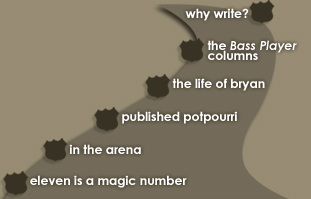
 |
|||||||||
|
|
|||||||||
| Sign up for BellerBytes, the official (and private) Bryan Beller e-newsletter. Just click here to sign up. Do it, OK? | |||||||||
|
Column
#1: Finding Your Path To Success I know what you’re thinking. Bass Player, in a desperate attempt to reach a new demographic, has employed the services of a motivational speaker to demonstrate how you--yes, you!--can achieve success as a professional bassist. All you have to do is read this column, think positive, and send just three installments of just $99 to the address below, and we’ll rush you our Subsonic Keys To Success audiotape series. Right? Sorry to disappoint you, but no. I’ll be appearing here every other month, with a license to expound on whatever “bass-centric” topics I see fit. And what better place to start than the grandest topic of all: achieving success as a bassist. I’m not much for scales and fretboard exercises anyway, so we might as well go high-concept right away. Let’s start with the obvious. In terms of pure numbers, you have chosen wisely. Compared to the throngs of aspiring drummers and guitarists who arrive on the scene with the alarming regularity of junk mail, you are the few, the proud, the in-demand. Bands and gigs are loath to let you go, because the other good bassists in town are too busy--and besides, those other guys don’t groove with the band’s three rotating drummers as well as you. (In Los Angeles, bandleaders are downright possessive of their bassists.) So armed with this knowledge, how does an ambitious, knowledge-seeking bassist achieve success in this business? It’s all a matter of how you define “success,” one of the most subjective words ever to grace Webster’s. To some it’s the utopia of simultaneously playing bass and putting food on the table. To others it’s nothing short of worldwide musical domination at any cost, be it personal, financial, or otherwise. The degrees in between vary so wildly that I could barely begin to try covering them all, but in the interest of clarity I’ll give it a shot. The Player. If you read this magazine long enough, you might think this is the most common type of working bassist. Yes, you can make a living doing clinics and high-profile gigs, appearing in ads, playing the frets off your bass, and hanging out with Marcus at the NAMM show. But there are only so many Oteils out there--and even if you have the talent, the self-marketing acumen, and the otherworldly musical presence to qualify, the openings for these slots are few. And the money isn’t nearly as good as it was in the go-go days of the late ’80s, when bass and amp companies were swimming in metal profits and promotional budgets were gaudy. In fact, in some cases a Player’s number of endorsements can be inversely proportional to his ability to pay for gear in the first place. In other words, success in this world isn’t all it seems, even for those who’ve achieved it. But it’s nice work if you can get it. That is, if you want it. The Music Addict. This is the guy who brings his Walkman into the shower with him. Sings bass lines in his sleep. Can’t survive a single second without some kind of musical accompaniment. Will do any gig, no matter the money, how far the drive is, or how long each of the six sets are, because it’s music. This hardship tolerance is a gift, and these people involuntarily use it to their advantage. Doing lessons on the side is often a practical way for the musically addicted to make ends meet. Not everyone can live like this, but every hole-in-the-wall gig these people take could very well lead to a better one down the road. And to Music Addicts that’s success, because no matter what the gig is, it’s still music. They don’t have to milk cows to pay the rent, even if they subsist mainly on pork rinds. The Financial Planner. A distant cousin of the Music Addict, this clever sort knows all about the scarcity of good bassists, seeks out the highest-paying gigs, and does them: commercial studio work, casuals, corporate gigs, tribute bands, whatever. You won’t catch these bassists starving, because they define success as being able to play for a living and still have enough money to: (a) feed their families something other than pork rinds; (b) take someone out to dinner and actually pay the bill; (c) buy a new piece of gear without scrambling for an endorsement; (d) take a weekend off without fear of creditors finding them at home. Being completely devoid of any Financial Planner characteristics is asking for trouble, yet being overwhelmed by them may present a spiritual dilemma. Again, success is in the eye of the beholder. The Picker & Chooser. This type isn’t a music addict but still wants to play professionally for both fulfillment and occasional profit. Pickers & Choosers take gigs that make sense to them both musically and financially. A dollar shortfall can be made up with a job that may or may not be musically related. This way they get to keep their bass jones fresh, still play for part of their living, and not go completely broke. It involves compromise and strong time-management skills, but in many cases it allows someone who has significant non-musical interests to be a professional bassist without losing his mind. I could go on, but I’ll get to the point. You might feel you don’t fit into any of these categories, but that’s the whole idea. Every bassist has a different definition of success. The key is to find the right mix for you. Maybe you’re part Music Addict, part aspiring Player. Or part Financial Planner, part Picker & Chooser. Maybe you’re lucky enough to already be making a living playing exactly the music you want whenever you see fit. If so, bully for you. But if not, you’re in the same boat I am, struggling to find the right path to whatever you consider “success.” To you, I can say only this: Find it. And then take it. By Bryan Beller, copyright 1999 United Entertainment Media. Reprinted from the Fall 1999 issue of BASS PLAYER. Reprinted with permission from BASS PLAYER. For subscription information, please call (850) 682-7644 or visit www.bassplayer.com |

|